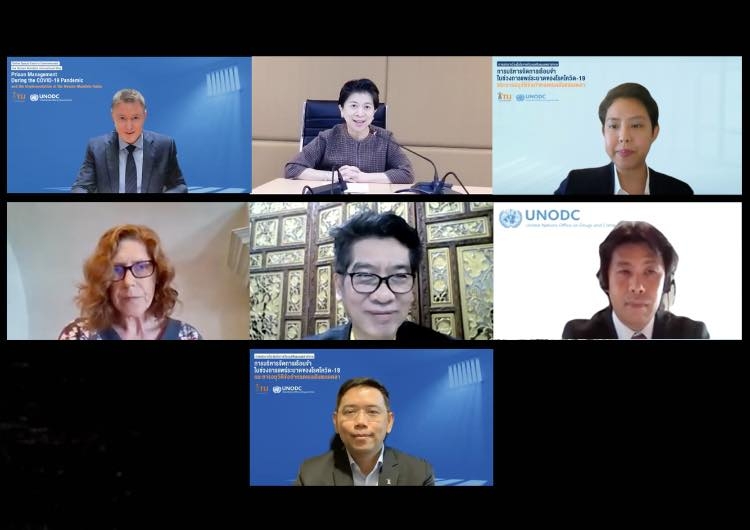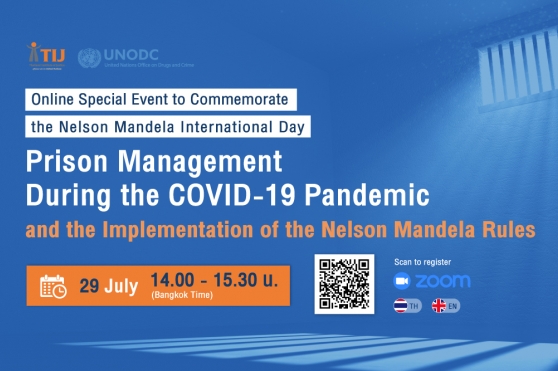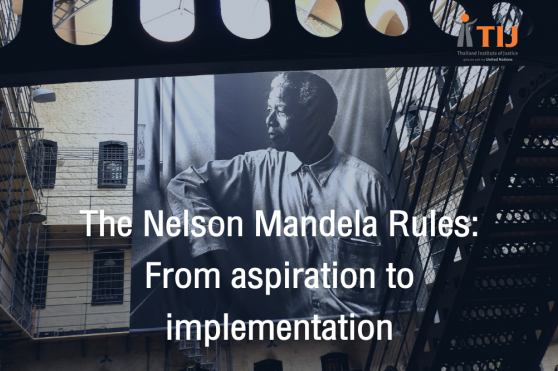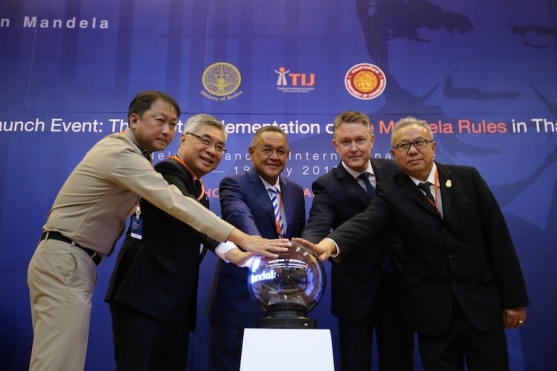Discussion Summary for Nelson Mandela International Day on “Prison Management during COVID-19 and Implementation of Nelson Mandela Rules”
On the 29th of July 2021, the Thailand Institute of Justice (TIJ) together with the United Nations Office of Drugs and Crime hosted an online panel discussion on “Prison Management during COVID-19 and Implementation of Nelson Mandela Rules” on the anniversary of Nelson Mandela International Day, the 18th of July. The discussion was held as a platform for concepts and guidelines exchange on management of COVID-19 situation in prisons. Also, it was for the launch of the Thai version of the Nelson Mandala Rules E-Learning Course which focuses on scenario-based learning. Representatives from multiple agencies in the justice system along with more than 200 audience members from all over the world attended the online panel discussion which was moderated by Miss Salila Narataruksa, Project Manager of the Thailand Institute of Justice.
Prior to the start of the event, Mr. Jemery Douglas, representative from the United Nations Office of Drugs and Crime Southeast Asia and the Pacific had welcomed all participants to the discussion. Mr. Douglas provided that the event aimed to raise awareness on the United Nations Standard Minimum Rules for the Treatment of Prisoners (the Mandela Rules) and reiterated the importance of its implementation in the field of corrections, especially prisoner treatment. Another focus of the event was the COVID-19 prevention in prisons. He also emphasized that prison management has to take into account requirements under existing standards, i.e. the Mandela Rules, the Bangkok Rules and non-custodial measures, and particularly so for the treatment of female prisoners. Mr. Douglas also added that the UNODC Southeast Asia and the Pacific has been supporting protective equipment for prison guards in many countries.
On this occasion, Miss Pornprapai Ganjanarintr, Chairperson of the National Human Rights Commission had opened the event by stating that treatment of prisoners has to be based on human dignity and human value. Prisoners are part of the vulnerable groups that are under the custody of the state and, hence, the state is obliged to take care of them. Particularly under the COVID-19 pandemic, prisoners shall be eligible to receive protection and medical treatment equivalent to those provided to the general population by the state. Measures shall be put in place to provide access to public health services information pursuant to human rights standards.
The panel discussion started on the topic of “Good Health Good Heart Project and Prison Management amidst COVID-19 Pandemic”. Dr. Weerakit Harnpariphan (M.D.), Deputy Director-General of the Thai Department of Corrections, Ministry of Justice had mentioned the success stories of the Good Health Good Heart Project as a major contributor of medical resources for under-resourced prisons. Dr. Weerakit also reported on the situation and policies of Thai prisons during the COVID-19 pandemic. He also reported that more than 20 percent of the entire prison population had been vaccinated and that vaccination had been arranged for prison guards. Department of Corrections upholds the principle of preparedness, security and safety of prisoner admission as well as robust communication and collaboration with other agencies and also human rights principles of the prisoners.
In respect of the international dimension, Piera Barzano, Programme Consultant and Miss Chontit Chuenurah, Director of Office for the Bangkok Rules and Treatment of Offenders of the TIJ had given the presentation on the topic of “Global Study on the Impact of COVID-19 on Prison Health”. The session allowed an exchange of information relating to the research project(s) on the impact of COVID-19 on health care systems in prisons worldwide.
Piera Barzano presented that the COVID-19 impact had spread worldwide, hence, the situation demands urgent prison health care improvement, especially the issue of prison overcrowding. Prison overcrowding can be addressed by delaying the court’s ruling process, early releasing vulnerable prisoners or limiting high-risk activities, etc. Even though the situation might have pressured prisons to adapt and be more open for higher application of technologies, prisons globally are still widely facing public health challenges as a result of the pandemic.
Miss Chontit proposed ways in which prisons can be prepared for future crises. She also proposed ways to address prison overcrowding by building alliances within the justice system for collaboration. The prison health system has to be improved alongside the implementation of the Mandela and Bangkok Rules. Strong coordination with public health services has to be established as well as the development of guidelines for prison crisis management. For prisons that are containing the spread of COVID-19, it was recommended that prisons overcrowding reduction measures shall be implemented. Prisoners' data, both general and in-depth, shall be collected and communication shall be conducted efficiently. Prisons can also apply technologies to support the implementation of existing measures. Moreover, consideration shall be given to mental health issues and stress levels which may result from the strict control measures. It also proposed that vaccination should also cover the prisoners and prison guards.
Later in the discussion, Naoki Sugano, Crime Prevention Criminal Justice Officer of the UNODC, shared the missions of UNODC supporting the criminal justice system in South East Asia. On this occasion, the Thai version of the Nelson Mandala Rules E-Learning Course was launched. The Course was created to develop an understanding of the Mandela Rules and its implementation by the prison officials. TIJ had supported the translation of the Course materials into Thai. Each of the chapters consists of the content on the provisions and how to apply them. Scenarios were included to educate learners on how to appropriately implement the Mandela Rules under different circumstances. Furthermore, there are also evaluation tests at the end of each chapter. The Course takes a self-learning approach and comes free of charge.
During the Q&A session, the panel provided their responses regarding measures on the treatment and classification of infected inmates as part of the management practices taken during the pandemic. Another question concerned the issue of human rights and disease control measures, i.e. vaccination of prisoners and restrictions of visitation, etc. The exchange relating these issues will enhance the criminal justice systems in tandem with human rights issues.
Towards the end of the panel discussion, Dr. Phiset Sa-ardyen, the Executive Director of Thailand Institute of Justice, delivered his closing remarks by mentioning the connection between prison management amidst the COVID-19 pandemic and the Mandela Rules which prioritizes prison public health services. COVID-19 pandemic has highlighted the vulnerabilities of prisons as prisoners are from the background with higher health risks than the general population. To overcome this crisis, it is essential that close collaboration among concerned agencies has to be established without leaving the most vulnerable behind. He ended by stating that the implementation of Mandela and Bangkok Rules in prison management would promote the efficiency of corrections work while maintaining the fundamental human rights of those in custody which are the essence of prison management in the normal situation and even more so in this critical time.






